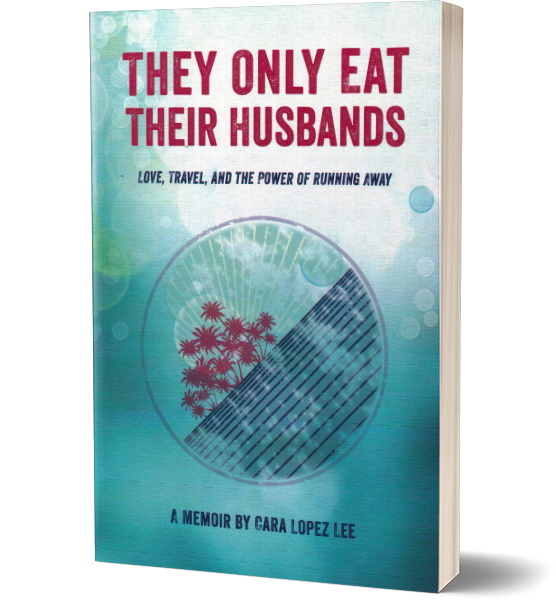In the spirit of adventure, as well as inclusiveness and hospitality, today I’m breaking with tradition and welcoming the first man ever to post on Girls Trek Too. Andrew Rooney is a fellow Denver author who loves to travel, and when he told me he had lived in Africa, how could I resist inviting him to join us here?
Spring Break in Cameroon
by A. Rooney
When we got back from our college recruiting trip to the south, it was spring break at the American University of Nigeria, where I’d been teaching since 2006. For my break, I decided to go to Cameroon, the country next door and just across from Yola, where the university was located. I borrowed someone’s car and talked two other teachers into coming along: Ward and Jean-Marcel. We took off with passports but no visas. “Who needs visas?” I said. “If they send us back, they send us back.”

For my spring break from the University of Nigeria, I decided to go to Cameroon, the country next door.
The idea was to rendezvous at the border with staff from the small wildlife college in Garoua, Cameroon. One of our crew was supposed to drop me and another teacher off when we saw them, but no wildlife college folks were there when we arrived, so we took the car on to Garoua.
The city is the northern capitol and a French-speaking town, as is most of the country, and they have a few good restaurants and even boulangeries. Doesn’t sound like much, but when you come from the outpost of Yola you appreciate these things.
Once we got there, we were waved down by the cops. I was driving and said, “Forget it. They don’t have radios or phones or guns or cars and if we stop they’re going to want money.” (Living in Nigeria had taught me that.) So I kept on driving and acted like a dumb tourist when they blew their whistles and tried to wave us over.
The car went back the next day with Ward. Jean-Marcel, a Cameroonian, went off to his folks. I went out for a trek.
Down the road I went Monday morning toward Parc du Faro, or Faro National Park, with Robert and Etienne of the wildlife college, or Ecole du Faune du Garoua. When I asked about provisions and water they were surprised; they were just going to wing it, pick up what they could along the way. I could just see myself squatting by the side of the road for the umpteenth time after I had a jug of local water and a slice of bushmeat. We found bottled water, canned meat, and nice baguettes in a market.
At Parc du Faro, we stopped at government offices to check in, and to see how much damage poachers had done. After pictures and a visit to a watering hole for baboons, we were on to Wangai, at the base of Mt. Atlantika. In Wangai, I met the village chief.

In Wangai, I met the village chief.
On the road, Robert told the story of the time he and some of his students were doing an animal count in the park. They came to a river where springbok fed and jumped down off the bank to streamside. When he turned to look back at a student still on the high bank, he saw two lions tucked under the curl of the bank waiting for tasty springbok to appear for lunch. “Uh-oh,” Robert said, or something like that, and then the lions climbed out to have a look at them. For whatever reason, the big cats sniffed and wandered off, not feeling like they wanted to bother with a group of scruffy locals.
It was Robert’s suggestion that we trek up Mt. Atlantika and visit the Koma people. He made this big deal about them still being naked and wearing only leaves front and back and nothing on top. How hard could it be, I thought, climbing a mountain in Cameroon? Heck, I’m from Colorado.

It was Robert’s suggestion that we trek up Mt. Atlantika and visit the Koma.
It turned out to be a very demanding hike up a shaley, rugged trail. All along the way we encountered barefoot people carrying loads on their heads going to market. And, in fact, our porter trekked the entire way in cheap flip-flops, with a big box on his head.

All along the way we encountered barefoot people carrying loads on their heads going to market.
We arrived at our destination around 3:00 in the afternoon, having started out at 6:30 in the morning. Robert was right: the women were wearing leaves in front and back, but nothing on top, and they had knocked their two front teeth out as a sign of beauty.

Robert was right: the women were wearing leaves in front and back, but nothing on top, and they had knocked their two front teeth out as a sign of beauty.
On top, they had plenty of water and grew bananas as well as papayas, millet, and groundnuts, and raised cattle and goats. It was the continental divide, sort of, between the two countries. I could look down on Nigeria on one side and Cameroon on the other.
The trip back was equally strenuous, because it was the same thing, only in reverse, and my thigh muscles were already maxxed from the day before. Never did a bomber of Star beer and a bowl of peanut-goat soup taste so good (with a little ibuprofen).
Next day was International Day of the Woman, and in Cameroon thousands of them had sewed up outfits with the UN logo, all in the same colors. We stopped at Robert’s cousin’s bar for a beer (Robert’s solution to every problem) and found the ladies exercising their right to imbibe. I especially liked Cameroon because they served big bottles of club soda everywhere, my favorite drink, and because the electricity worked, not like a neighboring country whose name began with N.
A couple more nights in Garoua and Robert deposited me back at the Cameroon-Nigeria border, where my colleague, Ward, met me on his motorcycle. It was a rough road back, hot as hell, and bad drivers, but I made it, and that’s all you can say sometimes when you return from a trip that gets invented as you go.
When I got home to my university apartment, I remember thinking, “Man, I needed that trip.” Maybe there was a chemical buildup from sitting too long and grading papers. Maybe it was just time to have a look at different country. Maybe I needed the small amount of danger it presented. But I came back smiling, with grit in my teeth, and no malaria or typhoid. And you know a day without malaria and typhoid in West Africa is always a good day.
***
 After teaching for two years at the American University of Nigeria, A. Rooney returned to the U.S. in 2008. His novel, The Fact of Suffering, takes place in Nigeria. His short story collection, The Colorado Motet, was published in 2005. His travels include Africa, Southeast Asia, China, Tibet, The Middle East, Mexico, and Canada. He teaches graduate creative writing at Regis University.
After teaching for two years at the American University of Nigeria, A. Rooney returned to the U.S. in 2008. His novel, The Fact of Suffering, takes place in Nigeria. His short story collection, The Colorado Motet, was published in 2005. His travels include Africa, Southeast Asia, China, Tibet, The Middle East, Mexico, and Canada. He teaches graduate creative writing at Regis University.




